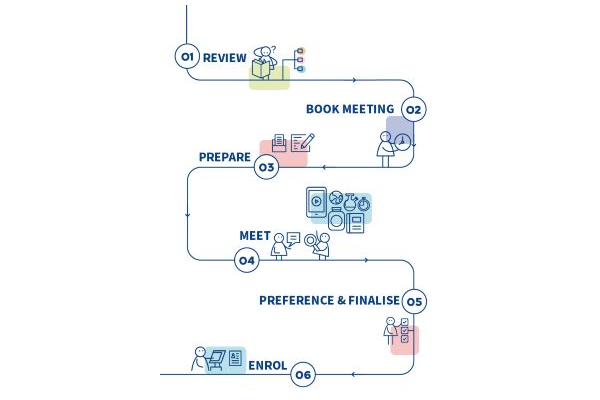MD Discovery 2 and Course Advisor program update
The Discovery team has made significant progress over the previous year in the MD1 space. We have successfully delivered the first iteration of Discovery 1: Foundation program, which enables our Parkville and Extended Rural Cohort MD1 students to explore seven topics.
 MD Course Advice 2 process.
MD Course Advice 2 process.
We’d like to thank the Discovery topic leads and their teams for such a successful launch of the program with each of the Discovery 1 topics. We must also mention the incredible work undertaken by the Learning Design team for their stunning Canvas design for each topic.
Our team are also finalising the Discovery 2: Application topics, to be rolled out to students next year. Discovery 2: Application is a second-year subject where students take their foundational knowledge and translate it to a workplace setting.
There are nine custom-built topics that students can choose from. As MD2 students shift to the clinical learning environment, the timing of Discovery terms will run as four-week blocks within four of the eight rotations planned for Principles of Clinical Practice 2.
The topics available for selection include:
- Communicating with the Machine
- Death and Dying: When is Dead Really Dead
- On Country for Health
- Hearing Impairment – the Hidden Barrier to Communication
- Making Healthcare Work: From Home to Hospital and Back Again
- Cardiac Point of Care Ultrasound
- Narrative Medicine
- Sexual Health Across the Clinical Contexts
- Translational Medicine
Students were also able choose a subject from another school in the faculty as their Discovery option. Twelve subjects are available from a wide range of areas including population and global health, psychological health, and digital technologies. Read more here.
The Course Advising program continued to provide support for students, helping them to understand the curriculum and navigate the subject options available to them. Our flipped classroom model of learning-centred course advising enabled reflection and offered both challenges and guidance. Students were asked to complete a pre-meeting Kaizen form to reflect on their MD1 Discovery experience, including identifying whether their learning needs were met and future areas of interest. They also identified knowledge or skill areas for growth and identified their initial Discovery 2 choices prior to the meeting.
Between August and October, we organised over 340 course advise meetings. Our team of seven course advisors facilitated a discussion about the student’s listed MD2 choices that aligned with their reflections and experiences from MD1 and their MD1 Discovery topic, as well as future areas of growth and interests. An unanticipated issue that arose in this second round of course advice meetings was that approximately 10 per cent of students did not attend their meetings.
Students then made their final preference choices after the meeting. Initial data suggests 95 per cent of students selected a Discovery topic as their first preference for MD2. We are currently collating the student feedback on their second course advice experience to guide the design of future meetings.
We would both like to extend our thanks to Professor Steve Trumble, Professor Julian Wright, Associate Professor Lisa Cheshire, Dr Anousha Yazdabadi and Tamara Clements for joining us in offering their time and expertise to our MD1 students as course advisors.
We would also like to thank Terry Judd and Sarah English for their assistance with Kaizen, and Michelle Curtis and her learning design team for their incredible organisation and design work.
We would also like to acknowledge the hard work of our academic programs staff, Aleisha Cox and David Gaherty, for their development of booking solutions, and their ongoing involvement and support to ensure success of both programs, it has truly been a huge team effort!
- Dr Cate Scarff, Discovery Lead and Kylie Fitzgerald, Course Advice Program Lead.